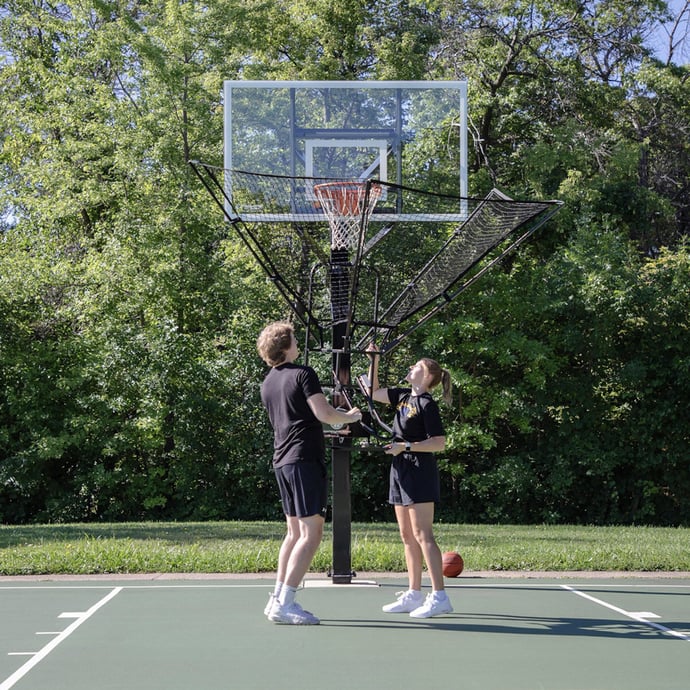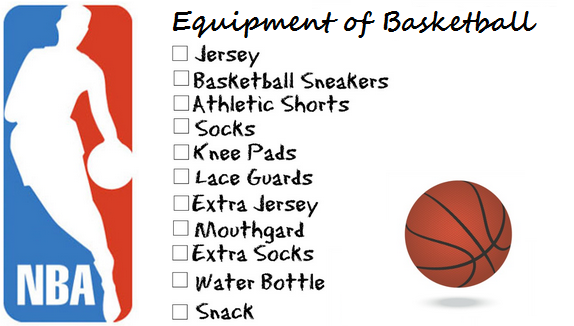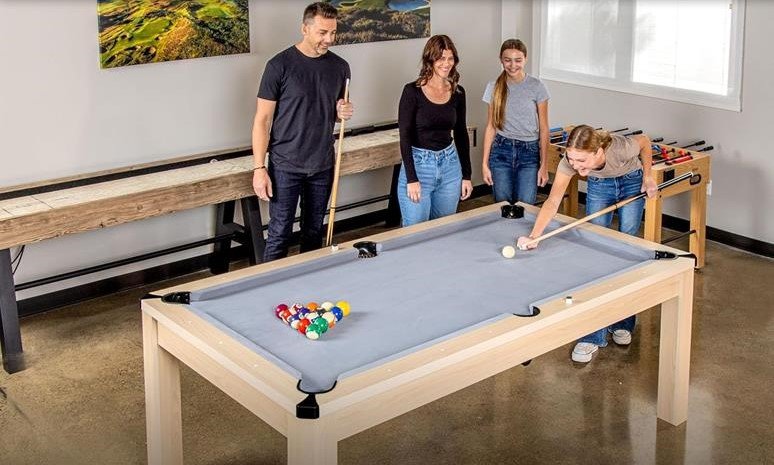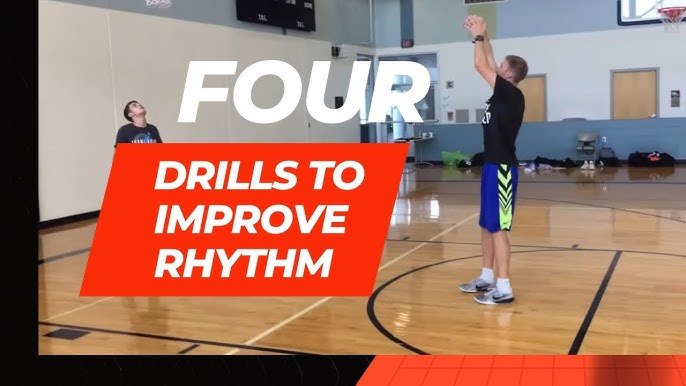Are you ready to hit the court and play basketball but unsure what gear you actually need? Getting the right equipment can make a huge difference in how you play and enjoy the game.
Whether you’re a beginner or just want to upgrade your gear, knowing exactly what to have will boost your confidence and performance. Keep reading to discover the essential basketball equipment that every player like you should have, so you can step onto the court fully prepared and ready to shine.
Basketball Shoes
Basketball shoes are key to playing well and staying safe. They support your feet during quick moves and jumps.
Choosing the right basketball shoes can help prevent injuries and improve your performance on the court.
Choosing The Right Fit
Shoes must fit snugly but not too tight. Proper fit avoids blisters and foot pain. Try shoes with the socks you wear to play.
- Check for enough room in the toe box
- Make sure the heel fits securely
- Test for comfort by walking and jumping
- Avoid shoes that pinch or rub
High-tops Vs. Low-tops
High-top shoes cover the ankle for extra support. They help reduce the risk of rolling your ankle.
Low-top shoes are lighter and allow more ankle movement. They offer more speed but less protection.
| Shoe Type | Advantages | Disadvantages |
| High-Tops | Better ankle support | Heavier, less flexible |
| Low-Tops | Lighter, more agile | Less ankle protection |
Sole Types And Traction
The shoe sole affects your grip on the court. Good traction stops slipping during quick stops and turns.
- Rubber soles offer strong grip on indoor courts
- Wavy or herringbone patterns improve traction
- Softer soles absorb shock and add comfort
- Hard soles last longer but may grip less
Basketball
Basketball is a popular sport played by people of all ages. To play well, you need the right equipment. This guide explains what you need to get started.
The main equipment for basketball is the ball itself. Choosing the right ball depends on your age and where you play.
Sizes For Different Ages
Basketballs come in different sizes to fit players of all ages. Using the correct size helps with control and comfort.
- Size 7 (29.5 inches) is for men ages 15 and up
- Size 6 (28.5 inches) is for women and boys ages 12 to 14
- Size 5 (27.5 inches) is for children ages 9 to 11
- Size 4 (25.5 inches) is for kids ages 5 to 8
Indoor Vs. Outdoor Balls
Basketballs are made for either indoor or outdoor use. Indoor balls feel softer and last longer on smooth courts.
Outdoor balls are tougher and resist rough surfaces like asphalt. Using the right ball keeps it in good shape.
- Indoor balls are usually made from leather or composite materials
- Outdoor balls are made from rubber or durable composite
- Outdoor balls are less expensive and more durable
- Indoor balls offer better grip and feel
Material And Grip
The material of a basketball affects how it feels and grips your hand. Good grip helps you control the ball better.
Leather balls have the best grip but need breaking in. Composite balls offer good grip and work well both indoors and outdoors.
- Leather balls are best for indoor use and feel soft
- Composite balls are versatile and easier to maintain
- Rubber balls are best for outdoor use and very durable
- Look for deep grooves on the ball for better grip
Apparel
Wearing the right clothes makes basketball more comfortable. Good apparel helps you move freely and stay cool.
Choosing proper basketball apparel protects your body and improves your playing experience.
Jerseys And Shorts
Basketball jerseys are light and loose to allow easy movement. Shorts should fit well and not restrict your legs.
Most players wear sleeveless jerseys and knee-length shorts made from breathable material.
- Loose fit for better movement
- Sleeveless jersey for arm freedom
- Knee-length shorts for comfort
Moisture-wicking Fabrics
Moisture-wicking fabrics pull sweat away from your skin. This keeps you dry and stops clothes from sticking.
These fabrics help you stay cool and focused during the game.
- Dry skin feels more comfortable
- Less sweat means fewer distractions
- Fabrics like polyester and nylon work well
Protective Gear
Protective gear helps avoid injuries on the court. Common gear includes mouthguards, knee pads, and ankle braces.
Wearing the right gear keeps you safe and lets you play with confidence.
- Mouthguards protect your teeth and mouth
- Knee pads cushion falls and knocks
- Ankle braces support joints and reduce sprains

Accessories
Basketball players use several accessories to improve comfort and safety. These items help prevent injuries and keep players focused.
Choosing the right accessories can make a big difference during practice and games.
Socks And Ankle Braces
Good socks protect feet and reduce blisters. Ankle braces support weak ankles and prevent sprains. Many players wear both for better foot care.
- Cushioned socks absorb shock
- Moisture-wicking fabric keeps feet dry
- Ankle braces provide extra stability
- Braces come in lace-up or slip-on styles
- Wearing braces can reduce injury risk
Headbands And Wristbands
Headbands keep sweat out of your eyes. Wristbands absorb sweat from your arms. Both help keep your hands dry for better ball control.
| Accessory | Main Purpose | Material |
| Headbands | Absorb sweat from forehead | Cotton or microfiber |
| Wristbands | Absorb sweat from wrists | Cotton or terry cloth |
| Headbands | Hold hair back | Elastic bands |
Compression Wear
Compression clothes help muscles recover faster. They improve blood flow and reduce soreness after playing. Many players wear compression shirts, shorts, or sleeves.
- Reduces muscle fatigue
- Improves circulation
- Supports joints and muscles
- Helps prevent injuries
- Keeps muscles warm
Training Equipment
Training equipment helps players improve their basketball skills. Using the right tools makes practice more effective.
Below are some key types of equipment that focus on specific skills like dribbling, shooting, and agility.
Dribbling Aids
Dribbling aids help players control the ball better. They improve hand speed and ball handling.
- Dribble gloves to strengthen finger control
- Weighted basketballs for better hand strength
- Dribble goggles to keep eyes up while handling
- Cone drills to practice changing direction
Shooting Targets
Shooting targets help players aim better. They teach accuracy and consistency in shooting.
| Type | Description | Use |
| Hoop Targets | Attach inside the rim | Improve shot precision |
| Net Targets | Hang on net | Practice making shots cleanly |
| Backboard Stickers | Mark spots on backboard | Focus on bank shots |
Agility Cones
Agility cones boost speed and footwork. They help players move faster and change directions quickly.
- Set up cone drills for lateral movement
- Use cones for sprint starts and stops
- Practice dribbling around cones
- Combine cones with ball handling drills

Court Essentials
Playing basketball requires the right equipment on the court. A good setup helps players practice and enjoy the game safely.
This guide covers important court essentials to prepare for basketball games or practice sessions.
Basketball Hoop Types
Choosing the right basketball hoop is key for a good playing experience. Hoops vary by size, material, and mounting style.
- Portable Hoops:Easy to move and adjust, good for driveways and practice.
- In-ground Hoops:Permanent and sturdy, ideal for home courts and parks.
- Wall-mounted Hoops:Save space by attaching to a wall or garage.
- Rim Types:Standard rims are fixed; breakaway rims flex on impact for safety.
Court Surface Options
The court surface affects grip, ball bounce, and player safety. Different materials suit different environments.
| Surface Type | Advantages | Disadvantages |
|---|---|---|
| Asphalt | Durable and common outdoors | Hard on joints, cracks over time |
| Concrete | Very durable, good for outdoor courts | Very hard, increases injury risk |
| Wood | Smooth, ideal for indoor play | Needs indoor, regular maintenance |
| Rubber | Good shock absorption, safer for joints | Can wear out quickly outside |
Lighting And Safety
Good lighting helps players see the ball and court lines at night. Safety features protect players from injuries.
- Install bright, even LED lights around the court.
- Use protective padding on poles and walls.
- Keep the court clean and free of debris.
- Mark clear boundary lines for safe play.
- Check equipment regularly for damage.

Frequently Asked Questions
What Basic Equipment Is Needed To Play Basketball?
To play basketball, you need a basketball, a hoop with a net, and suitable court shoes. Optional gear includes athletic clothing and protective gear like mouthguards.
Why Are Proper Basketball Shoes Important?
Proper basketball shoes provide ankle support, cushioning, and traction. They help prevent injuries and improve performance on the court.
Can I Play Basketball Without A Hoop?
While a hoop is essential for official games, you can practice dribbling and shooting without one. Portable hoops are a great alternative for casual play.
What Type Of Basketball Should Beginners Use?
Beginners should use a size 7 basketball for men and size 6 for women. These sizes offer better control and handling during practice.
Conclusion
Playing basketball requires some basic gear. Start with a good basketball and comfortable sneakers. Wear breathable clothing that allows movement. Protective gear like knee pads can help too. Don’t forget a water bottle to stay hydrated. These essentials ensure a good game.
Practice and enjoy the sport with friends or solo. With the right equipment, you’re ready to hit the court. Keep it simple, have fun, and stay active. Basketball is more than just a game. It’s about teamwork, fitness, and enjoyment.
So, gear up and start playing today.


